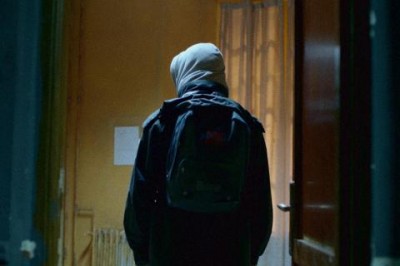| Reviews & Columns |
|
Reviews DVD TV on DVD Blu-ray 4K UHD International DVDs In Theaters Reviews by Studio Video Games Features Collector Series DVDs Easter Egg Database Interviews DVD Talk Radio Feature Articles Columns Anime Talk DVD Savant Horror DVDs The M.O.D. Squad Art House HD Talk Silent DVD
|
DVD Talk Forum |
|
|
| Resources |
|
DVD Price Search Customer Service #'s RCE Info Links |
|
Columns
|
|
|
Imposter, The

Reviewed at the 2012 South by Southwest Film Festival
Nicholas Barclay was 13 years old when he disappeared from San Antonio, Texas in 1994. His family wept, and searched, and held out hope. Three years and four months later, they got a call. Their Nicholas had been found, alone and without identification, in Spain. When they brought him back, no one seemed to think it all that strange that his hair had changed color. Or that his eyes had too. Or that he had a bad case of five o'clock shadow. Or that he suddenly spoke with a French accent.
The man who came back to Texas wasn't their son at all, of course; his name was Frédéric Bourdin, and he was a 23-year-old French con artist. "I wanted to be someone else," he explains in Bart Latyon's gripping documentary The Imposter. "Someone who was acceptable... I was reborn. I was born again."
Layton's interest falls into three areas: how he did it, why he did it, and how he got away with it. To explain them, he utilizes thriller-style reconstructions and a stylized approach that (as most reviews thus far have noted) often recalls Errol Morris. But it's not just a surface similarity; Layton shares the filmmaker's fascination with pauses, with faces, and with garbled technology. He has an eye for big open spaces, and an ear for regional speech patterns. And he clearly has a gift for sussing out a story that seems too good to be true.
He talks to the key players--Bourdin, Barclay's family, various officials who probably should have been a bit more perceptive. The man who finally smelled a rat proves the picture's most memorable character: Charlie Parker, a shambling, suspendered private investigator who's handed an entrance most movie stars would give their eye-teeth for (behind the wheel of a Cadillac, accompanied by late-period Johnny Cash).
Layton's pacing is often slow and deliberate in the early scenes, and for good reason--he's walking us through exactly how these seemingly incredible events occurred, and making clear exactly what happened when. As Bourdin's ruse starts to unravel, Layton pulls the film taut; having earlier juxtaposed interviews for comic effect, he crosscuts between them to create suspense in later scenes, as participants recall putting the pieces together and realizing the impossible. The final quarter or so of the film tosses all of our expectations up in the air--where is this going? What else is going on? And how could it possibly resolve itself?
When the story breaks, Layton shows Sam Donaldson reporting it on television, and posing the most prudent objection: "It's hard to imagine how he could've gotten away with it." As Donaldson's words hang in the air, the camera holds wordlessly on the faces of those involved. It is hard to imagine. But The Imposter is not just an interesting story of a clever hustler. It digs into the psychology of not just creating a lie, but believing one--and choosing to continue to believe one, long past the point of good common sense. And that's when it gets really interesting.
Jason lives in New York. He holds an MA in Cultural Reporting and Criticism from NYU.
|
| Popular Reviews |
| Sponsored Links |
|
|
| Sponsored Links |
|
|
| Release List | Reviews | Shop | Newsletter | Forum | DVD Giveaways | Blu-Ray | Advertise |
|
Copyright 2024 DVDTalk.com All Rights Reserved. Legal Info, Privacy Policy, Terms of Use,
Manage Preferences,
Your Privacy Choices | |||||||











